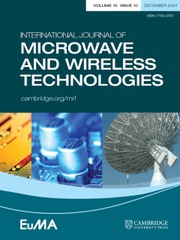Compact dual-band axially corrugated profiled horn for prime-focus reflector antenna
Published online by Cambridge University Press: 12 May 2011
Abstract
This paper reports a new compact dual-band axially corrugated profiled horn feed (DBCPH) for prime-focus reflector antenna at C-band (uplink and downlink frequency bands with bandwidth ratio of 1.6). DBPCH consists of one sinusoid profiled section and two internal axial corrugations (internal short-circuited ring slots), for obtaining a multimode horn feed. Such a blended structure is optimized over the specified frequency bands (3.68–3.70 and 5.865–5.915 GHz) to achieve various performance objectives (such as compactness, return loss, polarization purity, etc.). Measured and predicted results show that DBCPH provides better return loss >18.6 dB, low cross-polarization (better than −32 dB), and adequate edge taper at ±48° (8.5–11.7 dB) along with compact size (1.3λ aperture diameter and 0.88λ length at lower frequency). The horn would be used as a feed element for front-fed prime-focus reflector for pencil beam spacecraft antenna application.
Keywords
- Type
- Industrial and Engineering Papers
- Information
- International Journal of Microwave and Wireless Technologies , Volume 3 , Issue 4 , August 2011 , pp. 493 - 496
- Copyright
- Copyright © Cambridge University Press and the European Microwave Association 2011
References
REFERENCES
- 2
- Cited by


